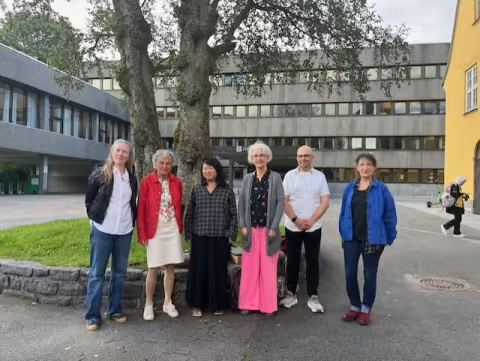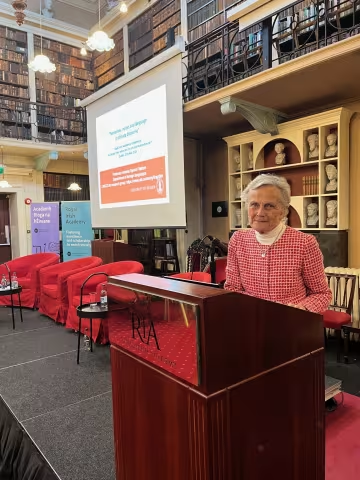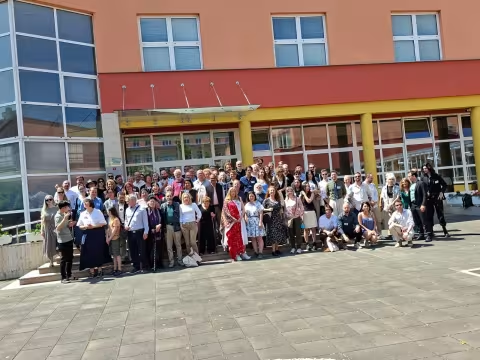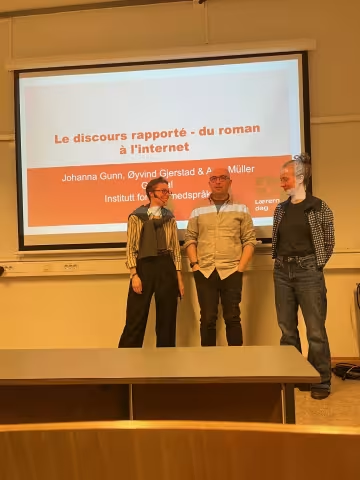LINGCLIM: Language, climate and lifestyle
The LINGCLIM research group undertakes research on narratives and language use related to issues of climate change, energy transition, nature and ecology, in a cross-disciplinary perspective.
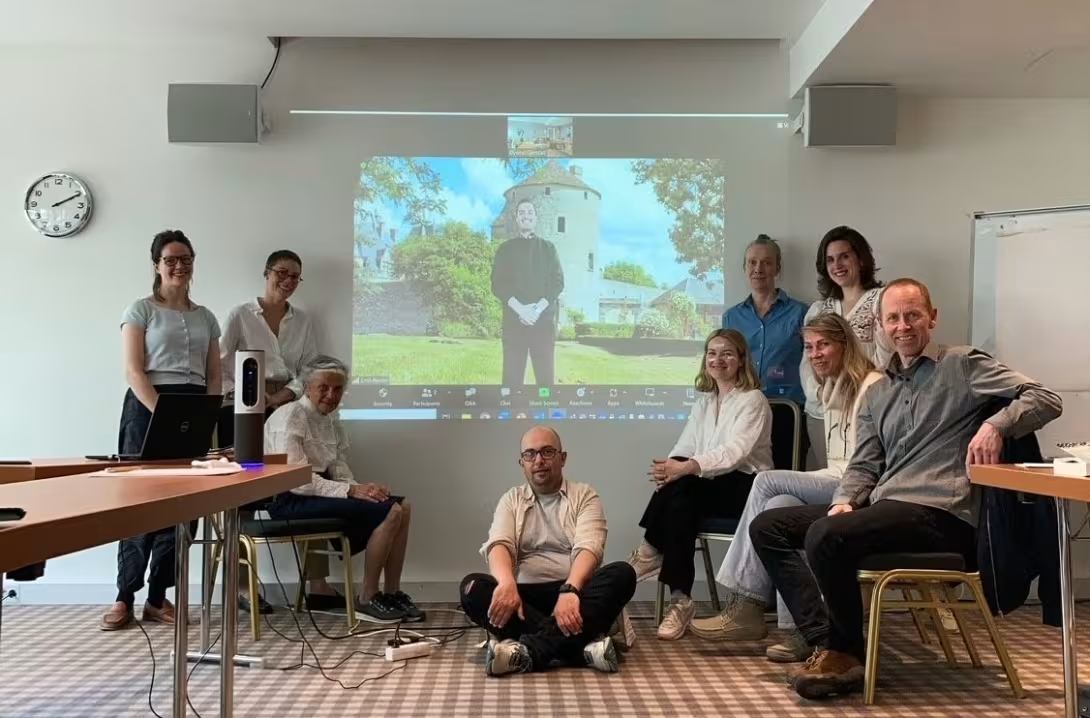
About the research group
Climate change is no longer conceptualized as only a physical phenomenon. As the effects are increasingly being felt, the social, political, ethical and cultural dimensions of climate change become apparent, as do its complex relations with the natural environment. This gives rise to debates and narratives with many different voices, views and interests.
Communication and language use are therefore important in both the dissemination and interpretation of climate and environmental issues. Language does more than represent; language also influences attitudes and behaviors, and creates new stories and realities.
LINGCLIM studies this complexity through literature, linguistics, and philosophy, forming interdisciplinary approaches within the environmental humanities.
Professor Kjersti Fløttum started the cross-disciplinary LINGCLIM research group in 2010 and headed it until she retired August 2023. She is still active in the group as professor emerita. The research group has collaborated with NORCE (external link), the Bjerknes Center for Climate Research (external link), NHH Norwegian School of Economics (external link), the Research group for Environmental Humanities (HUMKLIM) and Centre for Climate and Energy Transformation (CET). For surveys and experiments LINGCLIM has collaborated with the Norwegian Citizen Panel within the DIGSSCORE infrastructure.
Featured
Projects
CLIMLIFE
The cross-disciplinary CLIMLIFE project studies how Norwegian citizens relate the challenges of climate change to their normal, day-to-day life choices.
Main content
While there is broad agreement on the urgency of the situation, people must also go on living their daily lives. We all need to attend to our own needs and interests, our family and community.
Recent research shows that, when asked about solutions to tackle climate change, Norwegian citizens generally say “we must all contribute”. However, what does this mean more specifically? How willing are we to change our lifestyle? How do people, in particular young people, relate these challenges to their everyday life choices? And how do politicians and the media address lifestyle questions?
We suggest that people use mainly four strategies for integrating, or not, the challenges of climate change into their lives:
- Activism: People engage actively to influence policies to mitigate climate change.
- Responsiveness: People respond in accordance with incentives designed for climate-friendly behaviour.
- Resignation: People recognize the problem but give up engaging with the complex challenges of climate change.
- Rejection: People actively choose not to consider climate change in their choices.
The CLIMLIFE project studies these questions through a cross-disciplinary collaboration, including researchers from linguistic, media, political and natural sciences. Our material consists of a combination of Facebook data and data from open-ended survey questions (Norwegian Citizen Panel/DIGSSCORE), where citizens, politicians and journalists can answer in their own words. We use different tools for language analysis, in a combination of quantitative and qualitative methods.
Project goals:
- Develop knowledge about the role of the climate in questions about lifestyle, about both obstacles and opportunities for a climate-friendly lifestyle
- Examine what motives or strategies people have for changing - or not changing - lifestyle
- Compare the concordance or inconsistency between the opinions of citizens, politicians and journalists
- Explore in particular the young people's perspective on climate and way of life
- Further develop interdisciplinary research based on linguistics
Major outcomes of CLIMLIFE will be vital knowledge about the role of climate change in everyday lifestyle matters, revealing barriers and opportunities, conflict and consensus. This will be applicable knowledge for stakeholders in general and politicians in particular.
2O2CM
Overcoming Obstacles and Disincentives to Climate Change Mitigation: A cross-cutting approach by human and social sciences.
This research project has the transformative aim to improve the scientific understanding of why societies remain indifferent to the risks of climate change, and to understand how multimodal devices and recommendations can convert apathy into action.
Main content
Kjersti Fløttum, leader of the research group LIMCLIM, has together with associate professor Øyvind Gjerstad and seven other researchers in Belgium and France received support for the three-year research project "Overcoming Obstacles and Disincentives to Climate Change Mitigation: A cross-cutting approach by human and social sciences". The project is funded by the research councils in Norway, Belgium and France.
Abstract
Climate change today is undoubtedly a challenge for humanity. The Special IPCC 1,5 °C report highlighted the numerous dramatic consequences of climate change; yet, the response of our societies has been slow, contradictory and elusive. Climate change and its consequences are particularly embedded in culture, making it difficult for individuals and societies to manage these phenomena cognitively (Fløttum, 2018: 21): "[it] moved from being a predominantly physical phenomenon to being simultaneously a political, social, and cultural phenomenon - and thus, a communication challenge". The humanities and social sciences are called on to make a crucial contribution to the understanding of how humans approach and make sense of climate change, in order to reduce the value-action gap, using innovative forms of communication to identify entrypoints for climate action.
This research project has the transformative aim to improve the scientific understanding of why societies remain indifferent to the risks of climate change, and to understand how multimodal devices and recommendations can convert apathy into action. We will look into the active and essential role of language, narrative, and discourses in shaping citizens’ beliefs and actions, through the interdisciplinary and transdisciplinary collaboration between linguistics, semiotics, law and governance, anthropology and social psychological approaches. The project will develop a practical tool in the form of an open-source toolbox platform, providing recommendations, prototypes and resources to citizens, public decision-takers and nongovernmental organisations on climate change communication strategies. The project will focus on Belgium, France, and Norway. The toolbox will be tested notably in the course of the deployment of “Opt4Climate”, a campaign led in Belgium by the major actors of the climate social movements, with the support of the King Baudouin Foundation. Through analyses of survey discourse and answers, and of social media data, the aim of the project is to contribute, through transformational learning, to an innovative understanding of Europeans’ individual and collective values, beliefs, and interests as regards obstacles versus opportunities to reducing greenhouse gas (GHG) emissions and thus to climate change mitigation.
WP1 (Lead Belgium) will focus on the coordination of the project as a whole. WP2 (Lead Norway) will look into how people perceive and interpret narratives concerning climate change issues and how social actors construct their positions on climate change by mediating different voices in society. WP3 and WP4 (Lead Belgium) will be based on a semiotic and rhetoric approach of online discourses about climate change, aimed at identifying (1) scepticism, denial, disagreement, and conflict in Reddit argumentations (Cougnon et al., 2019); (2) ideologically charged policies from public decision-takers on Twitter; and (3) the interaction between image and text that facilitates or complicates dialogue, understandings, and calls for action on YouTube and Instagram. In line with WP2, WP5 and WP6 (Lead France) aim to examine how and why individuals can remain indifferent or sceptical to the risks of climate change, as well as what interventions might be carried out to challenge mindsets and motivations. First, social-psychological factors that determine citizen engagement in environmental behaviours will be explored. Second, we will analyse the effects of the climate change risk on citizens’ perceptions, behaviours, and attitudes. All the WPs work together for a transformational learning that will enable citizen empowerment and engagement of decision-makers.
The methods used will combine qualitative as well as quantitative surveys and laboratory experiments (including eye-tracker and facereader evaluations). The project involves close collaboration with non-academic partners with whom concrete outputs for the project have already been defined.
About JPI Climate
The Joint Programming Initiative "Connecting Climate Knowledge for Europe" (JPI Climate) is a pan-European intergovernmental initiative gathering European countries to jointly coordinate climate research and fund new transnational research initiatives that provide useful climate knowledge and services for post-COP21 Climate Action.
JPI Climate connects scientific disciplines, enables cross-border research and increases the sciencepractice interaction. JPI Climate contributes to the overall objective of developing a European Research Area and to underpin the European efforts in tackling the societal challenge of climate change.
People
Group manager
Øyvind Gjerstad Associate Professor, Department of Foreign Languages
Group members
Kjersti Fløttum Professor emerita, Department of Foreign Languages
Helge Drange Professor, Geophysical Institute
Dag Elgesem Professor, ICT and society, Department of Information and Media Studies
Trine Dahl Professor emerita, Norwegian School of Economics (NHH) - Professional and Intercultural Communication
Birger Solheim Associate Professor, Department of Foreign Languages
Sonia Cecilia Lagerwall Professor, Department of Foreign Language
Emil Perron PhD Candidate, Department of Foreign Languages
Runa Falck PhD Candidate, Department of Foreign Languages
Solveig Helene Lygren PhD Candidate, Department of Foreign Languages
Johanna Gunn PhD Candidate, Department of Foreign Languages


